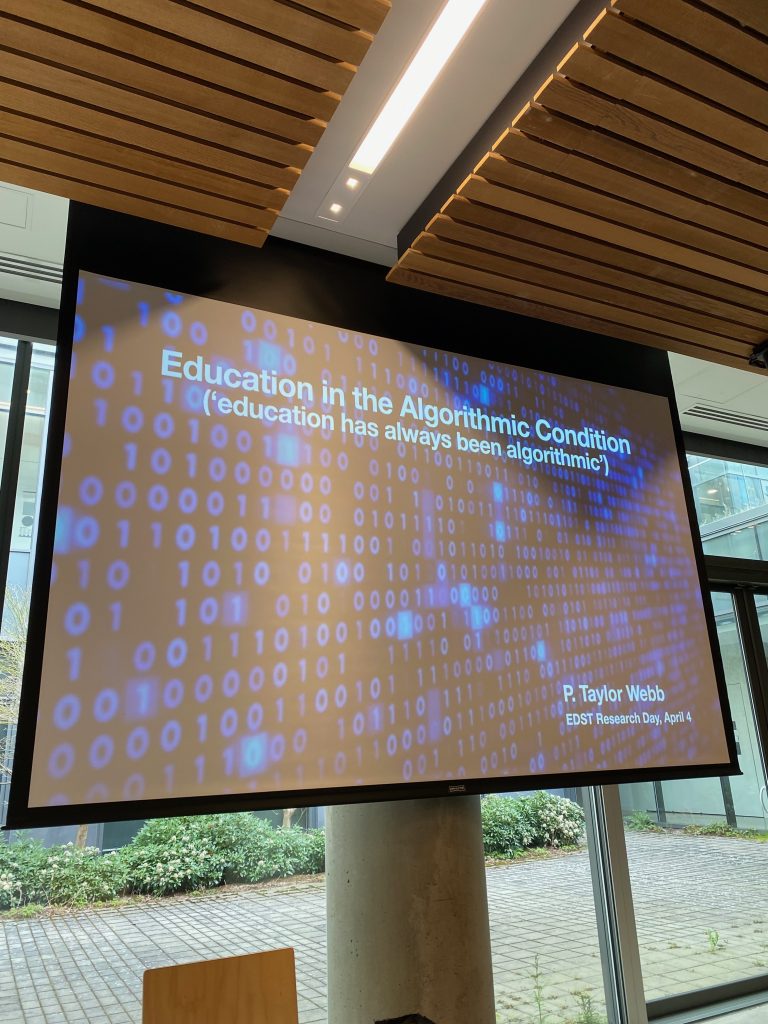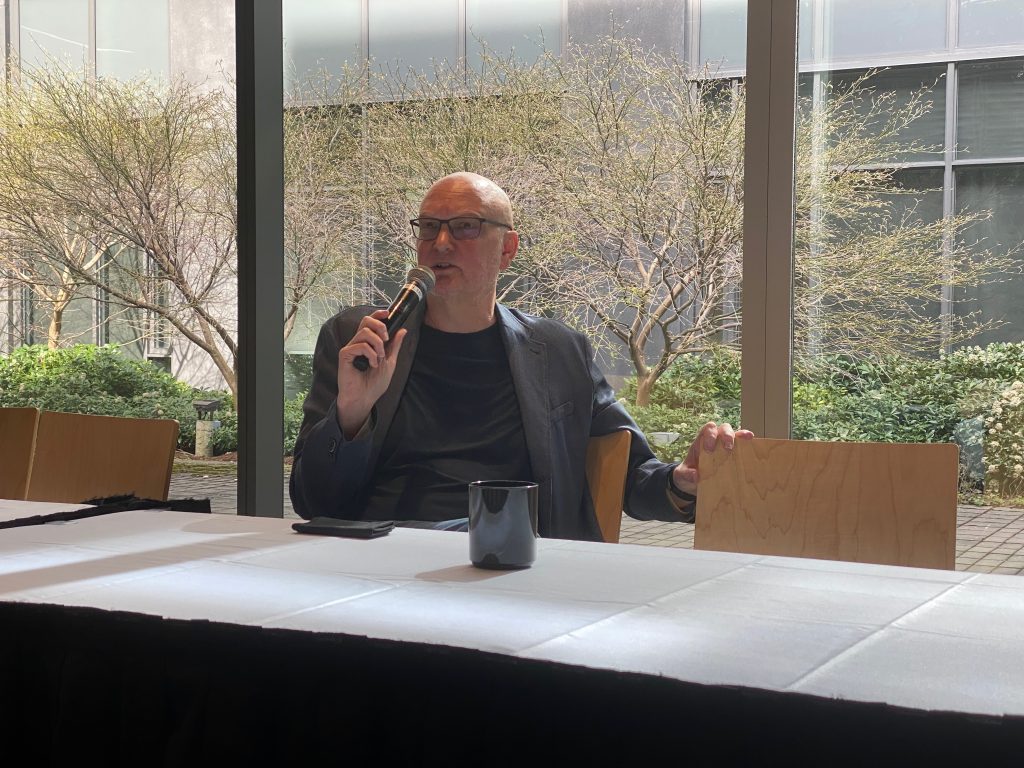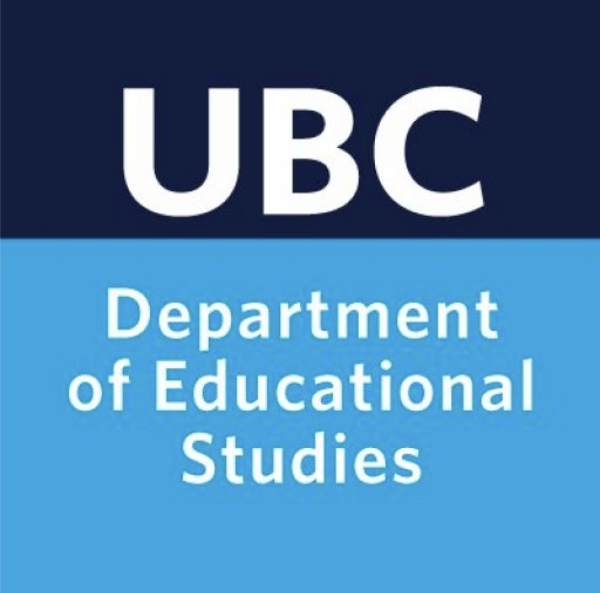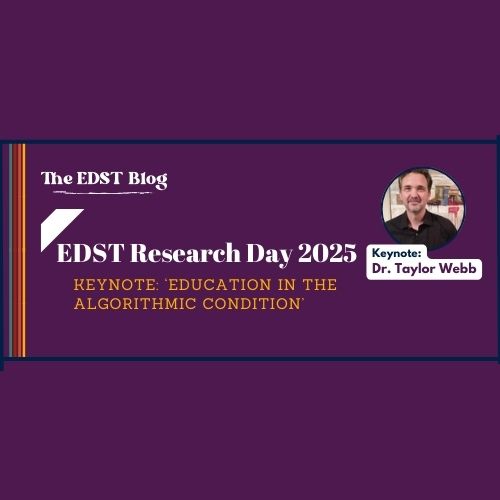At EDST Research Day 2025, keynote speaker Dr. Taylor Webb delivered a deeply thought-provoking address titled “Education in the Algorithmic Condition.” In front of a packed audience of students, faculty, and staff, Webb offered a compelling reframe: rather than seeing artificial intelligence (AI) as a novel intrusion into educational spaces, we should instead recognize that education itself has long operated on algorithmic logics.
“Education has always been algorithmic,” he argued. “It has not simply absorbed AI from the outside, but has actively contributed to the development and normalization of algorithmic governance.”
Webb’s presentation asked attendees to consider the longer histories and deeper philosophical underpinnings of the so-called “AI moment” in education. Drawing from traditions in critical theory, educational policy, and decolonial thought, Webb moved beyond simplistic debates about whether AI is good or bad. Instead, he urged the audience to interrogate the power structures that shape both educational systems and technological developments.

Algorithms, Not Just AI
One of Webb’s central interventions was the distinction between AI and the algorithm. While AI is often framed in popular culture as an autonomous, futuristic force—invoking fears of dystopian control or unbridled disruption—Webb reminded us that algorithmic thinking has deep roots in human history.
He referenced Lorraine Daston’s work on the history of rules, noting that algorithms—defined as procedural rules for calculation and problem-solving—predate computing by thousands of years. These logics, he explained, were not only mathematical but deeply political, serving as tools of imperial navigation, data extraction, and ultimately, colonial governance.
“Algorithms were essential to colonial conquest,” Webb noted, referencing Kara Keeling, who linked algorithmic epistemologies to practices like charting the Middle Passage.
This history, he argued, is inseparable from education. The classroom, the curriculum, and the child—central constructs of modern schooling—have been shaped by and have reinforced algorithmic forms of classification, optimization, and control.
Governing Through Code

Webb’s keynote explored how educational systems have been entangled in the development of technologies that now govern us. He cited Alan Turing’s 1951 paper, Intelligent Machinery, A Heretical Theory, in which Turing imagines training machines through binary inputs of “pleasure” and “pain.” Here, education becomes a prototype for machine learning.
This mechanistic view of the child, Webb explained, reappears in the foundational work of Seymour Papert and Marvin Minsky, and continues today in the work of researchers like Elizabeth Spelke, who study child cognition to inform AI design.
“Education didn’t just absorb AI—it helped birth it,” Webb noted. “From behaviorism to developmental psychology, we have shaped the metaphors, methods, and models used in intelligent systems.”
He linked these developments to the Macy Conferences (1946–1953), which gathered thinkers in cybernetics, psychology, and information theory to discuss the human-machine interface. These gatherings, Webb explained, had lasting influence on educational reform, particularly in the United States—impacting figures like James Comer, Urie Bronfenbrenner, and other architects of mid-century school models.
The Coloniality of the Algorithm
Perhaps the most urgent and moving portion of the talk came as Webb engaged with the work of Sylvia Wynter, Denise Ferreira da Silva, Zakiyyah Iman Jackson, and Katherine McKittrick. These scholars expose how algorithmic systems often reproduce the erasure of Black life, Indigenous presence, and colonized bodies—rendering them absent from the categories used to calculate, classify, and control.
Quoting McKittrick: “Black life is absent from the classifier algorithms that statistically organize our world… This absence affirms how the premature death of Black people is entrenched in algorithmic equations.”
As part of his speculative approach, Dr. Webb introduced new terms—such as “the colonial-rhythmic” and “algo-liberal”—to provoke fresh ways of thinking about education’s entanglements with algorithmic and colonial systems. These neologisms, rather than aiming for rigid definitions, functioned as conceptual tools: invitations to notice patterns that might otherwise go unnamed.
“The colonial-rhythmic” gestures to the recurring and recursive forms of governance rooted in colonial logics—those that count, categorize, and control populations through mechanisms like statistics and standardized education. “Algo-liberal” plays on the fusion of algorithmic reasoning and liberal governance, suggesting that today’s systems of schooling are shaped not just by democratic ideals, but by the instrumental logics of data optimization and behavioral management.
In coining these terms, Webb emphasized the power of language to open up new analytic spaces—spaces that challenge our assumptions, disrupt normative frames, and allow us to glimpse the deeper architectures of educational life.
“The colonial-rhythmic” and “algo-liberal” are not just academic inventions—they’re lenses to see how education has long participated in algorithmic control and colonial order.” – Webb
Webb’s reflections on this quote were powerful. He suggested that our fear of AI often masks a deeper anxiety: the recognition that education and computation have always been implicated in projects of control, exclusion, and erasure. By tracing these entanglements, he argued, we are better positioned to re-imagine both education and technology on different terms.
A Call to Rethink, Not Reject
Importantly, Webb did not call for the abandonment of technology, nor did he lean on familiar narratives of crisis or disruption. Instead, he asked the audience to slow down, to look closely, and to approach the algorithmic condition not as a problem to solve, but as a terrain to navigate—with criticality, curiosity, and care.
“If we want to imagine different futures,” he concluded, “we must first understand the histories—often hidden—that brought us here.”
His keynote resonated deeply with the day’s broader theme, “Education and the Machine,” offering a layered, nuanced starting point for the conversations that followed in breakout sessions, hallway chats, and podcast interviews.
We extend our heartfelt thanks to Dr. Taylor Webb for accepting the invitation to deliver this year’s keynote. His generosity of thought and commitment to critical inquiry set a powerful tone for Research Day 2025—and offered all of us much to reflect on in the days, months, and research projects ahead.
Note – Our podcast interview with Dr. Webb is coming soon, stay tuned!


Leave a Reply